Related Research Articles
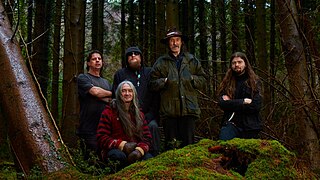
Hawkwind are an English rock band known as one of the earliest space rock groups. Since their formation in November 1969, Hawkwind have gone through many incarnations and have incorporated many different styles into their music, including hard rock, progressive rock and psychedelic rock. They are regarded as an influential proto-punk band. Their lyrics often cover themes of urban life and science fiction.

Stonehenge is a prehistoric megalithic structure on Salisbury Plain in Wiltshire, England, two miles (3 km) west of Amesbury. It consists of an outer ring of vertical sarsen standing stones, each around 13 feet (4.0 m) high, seven feet (2.1 m) wide, and weighing around 25 tons, topped by connecting horizontal lintel stones. Inside is a ring of smaller bluestones. Inside these are free-standing trilithons, two bulkier vertical sarsens joined by one lintel. The whole monument, now ruinous, is aligned towards the sunrise on the summer solstice and sunset on the winter solstice. The stones are set within earthworks in the middle of the densest complex of Neolithic and Bronze Age monuments in England, including several hundred tumuli.
A solstice is the time when the Sun reaches its most northerly or southerly excursion relative to the celestial equator on the celestial sphere. Two solstices occur annually, around June 20–22 and December 20–22. In many countries, the seasons of the year are defined by reference to the solstices and the equinoxes.
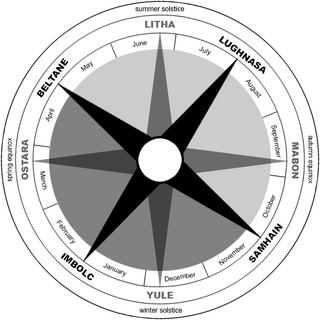
The Wheel of the Year is an annual cycle of seasonal festivals, observed by a range of modern pagans, marking the year's chief solar events and the midpoints between them. British neopagans Gerald Gardner and Ross Nichols crafted the Wheel of the Year in the mid-20th century, combining the four solar events marked by many European peoples, with the four seasonal festivals celebrated by Insular Celtic peoples. Different paths of modern Paganism may vary regarding the precise timing of each celebration, based on such distinctions as the lunar phase and geographic hemisphere.
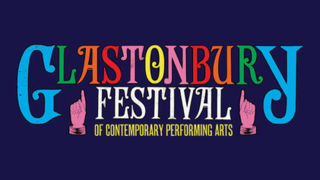
Glastonbury Festival is a five-day festival of contemporary performing arts held near Pilton, Somerset, England, in most summers. In addition to contemporary music, the festival hosts dance, comedy, theatre, circus, cabaret, and other arts. Leading pop and rock artists have headlined, alongside thousands of others appearing on smaller stages and performance areas. Films and albums have been recorded at the festival, and it receives extensive television and newspaper coverage.

Midsummer is a celebration of the season of summer, taking place on or near the date of the summer solstice in the Northern Hemisphere; the longest day of the year. The name "midsummer" mainly refers to summer solstice festivals of European origin, especially those in the Nordic countries. In these cultures it is traditionally regarded as the middle of summer, with the season beginning on May Day. Although the summer solstice falls on 21 or 22 June in the Northern Hemisphere, it was traditionally reckoned to fall on 23–24 June in much of Europe. In Christian tradition, these dates coincide with Saint John's Eve and Saint John's Day. It is usually celebrated with outdoor gatherings that include bonfires and feasting.

The Ashton Court Festival was an outdoor music festival held annually in mid-July on the grounds of Ashton Court, just outside Bristol, England. The festival was a weekend event which featured a variety of local bands and national headliners. Mainly aimed at local residents, the festival did not have overnight camping facilities and was financed by donations and benefit gigs.

The Stonehenge Free Festival was a British free festival from 1974 to 1984 held at the prehistoric monument Stonehenge in England during the month of June, and culminating with the summer solstice on or near 21 June. It emerged as the major free festival in the calendar after the violent suppression of the Windsor Free Festival in August 1974, with Wally Hope providing the impetus for its founding, and was itself violently suppressed in 1985 in the Battle of the Beanfield, with no free festival held at Stonehenge since although people have been allowed to gather at the stones again for the solstice since 1999.

The Battle of the Beanfield took place over several hours on 1 June 1985, when Wiltshire Police prevented The Peace Convoy, a convoy of several hundred New Age travellers, from setting up the 1985 Stonehenge Free Festival in Wiltshire, England. The police were enforcing a High Court injunction obtained by the authorities prohibiting the 1985 festival from taking place. Around 1,300 police officers took part in the operation against approximately 600 travellers.
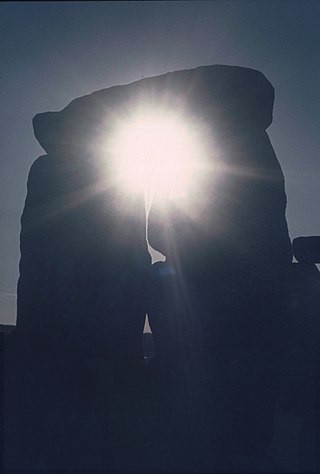
The prehistoric monument of Stonehenge has long been studied for its possible connections with ancient astronomy. The site is aligned in the direction of the sunrise of the summer solstice and the sunset of the winter solstice, and its latitude in respect to the Great Pyramid and Equator is precisely defined by the silver ratio. Archaeoastronomers have made a range of further claims about the site's connection to astronomy, its meaning, and its use.
This is a list of Stonehenge replicas and derivatives that seeks to collect all the non-ephemeral examples together. The fame of the prehistoric monument of Stonehenge in England has led to many efforts to recreate it, using a variety of different materials, around the world. Some have been carefully built as astronomically aligned models whilst others have been examples of artistic expression or tourist attractions.
Philip Alexander Grahame Russell, known as Wally Hope, was an experimental philosopher of the UK Underground and organiser of the Windsor Free Festival and the Stonehenge Free Festival.

The winter solstice, also called the hibernal solstice, occurs when either of Earth's poles reaches its maximum tilt away from the Sun. This happens twice yearly, once in each hemisphere. For that hemisphere, the winter solstice is the day with the shortest period of daylight and longest night of the year, and when the Sun is at its lowest daily maximum elevation in the sky. Each polar region experiences continuous darkness or twilight around its winter solstice. The opposite event is the summer solstice.
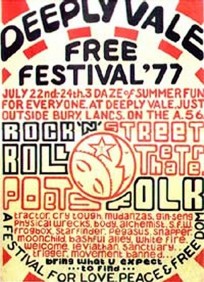
The Deeply Vale Festivals were free festivals held near Bury in northwest England in 1976, 1977, 1978 and 1979 and at a different site in 1980 and 1981. They are regarded as significant events that united punk music into the festival scene. Anniversary festivals took place in March 2015 and September 2016.

Xitintoday is a studio album released by Nik Turner's Sphynx in 1978. It was produced by Steve Hillage.

Arthur Uther Pendragon is a British eco-campaigner, Neo-Druid leader, media personality, and self-declared reincarnation of King Arthur, a name by which he is also known. Pendragon was the "battle chieftain" of the Council of British Druid Orders.
The Jobs for a Change festivals were two music festivals that took place in London, England in the mid-1980s, against a background of high unemployment, a year-long miners' strike, and Margaret Thatcher's development plans for the abolition of the Greater London Council (GLC). These events were free and attracted a huge audience. The first, on the South Bank in June 1984, drew about 150,000 people. The second, in Battersea Park the following July, attracted an estimated 250,000. The musicians included The Smiths, Billy Bragg, Hank Wangford, Aswad, The Redskins and The Pogues. There were also theatrical groups, cabaret, films and exhibitions, talks, debates and stalls set up by external organisations.
Sunrise Celebration is an ethical living, organic arts and music festival that used to take place in Bruton, Somerset, England on an organic farm and has now relocated to Pontrilas, Herefordshire.
Solstice are a progressive rock band formed in 1980 in Milton Keynes, England. They are led by guitarist Andy Glass, who is the sole founding member still in the band.

Ossian D'Ambrosio, also known simply as Ossian, is an Italian heavy metal musician, organiser within modern Druidry, artisan jeweler and writer. He is the founder and leader of the Cerchio Druidico Italiano and creator of an annual Beltane festival in Biella. He plays guitar in the symphonic black metal band Opera IX, which he founded in 1988.
References
- ↑ Stonehenge Stands Still - IT 1986
- ↑ Campaign details - IT 1986 Archived 2011-10-07 at the Wayback Machine
